WHICH DO YOU PREFER; AC OR DC (A REVISIT INTO THE WAR OF CURRENTS)
It’s been over a century since the war of currents ended between the famous Thomas Edison and the entrepreneurial George Westinghouse with George Westinghouse winning the rights to transmit AC power on a commercial basis. Series of events, debates, investments, and contributions went into this debate that spanned over 2 decades 1880-1900.
Though there had been certain basic development of AC generators since 1830 where the first ac motor was built, the pushers of AC didn’t have enough achievements and innovations to mount an attack over the then prevalent dc distribution systems. Industrialist started seeing the need to get a kind of power source to power their street lights transmit electricity through long distances. So when George Westinghouse got the patent from the original owner of the AC patent Nikola Tesla, he through influence and wealth was able to build more AC power plants. At that time the Thomas Edison’s company wasn’t slack either, they also went on to build a DC distribution system as a prototype for his New York neighborhood. The war was as fierce as the DC backers, going on to electrocute animals in defense of their argument that AC systems would cause more harm to lives than good due to its nature. Well in the real sense, it wasn’t really about Edison not liking the AC systems technically, it was more about his desire to prove to the world that DC distribution system is better than its AC counterpart in any case though. He lost.
AC AND DC DEFINED
Think of a generator, though it’s more technical in practice, generators simply operate by converting mechanical energy into electrical energy by the action of a magnetic rotating component cutting a stationary conductor, at every instant which the flux cuts the conductor, voltage and current is generated concurrently. The rotary nature of the flux is a function of time, that means that there is a difference in time between when the flux cuts the coil at first to the other, this time shift is referred to as ”phase difference”. The maximum current is induced at the time t where the flux cuts the coil and starts to drop into a negative polarity due to Faraday's laws of electromagnetism which postulate that the current generated would produce an emf travelling in such a way as to oppose it (-ve cycle) till another time (cycle) in which the flux cuts the coil again.
The above explanation gives a description of an AC system; therefore, we define Alternating Currents as currents whose values varies sinusoidally with time.
Simple Right?
The major difference between AC and DC generator is the commutator, the commutator is a device that converts the AC output into DC output by reversing the direction of the generated current thus creating allowance to travel in only one direction.
Hence we can say that a direct current is the current type in which the charge flows in only one direction, in essence.
SO THEN WHICH DO YOU PREFER
So here is the deal, I give you the facts and you be the judges to decide which you prefer.
In terms of transmission over long distances, during DC Transmission of high voltages, there is lesser rate of losses, in fact, the rate of loss in a DC transmission line over 1000 meters is just about 3-4% however in AC transmission, there are higher rates of power losses as the voltage propagates, it is always up to here we have up to 40% loss while transmitting over 1000metres. Because of this high efficiency rate it is only logical to reason that the insulation of an HVAC cables is quite more than that of the HVDC cables, not only the insulation but the size of HVAC cables is higher than the DC cable, because of this, transmission on HVDC is quite cheaper than transmission of HVAC lines.
While transmitting on HVDC, there is lesser risk of electrocution, in fact during the war of currents, one of the strong point of Edison was in the fact that human life is endangered by transmitting Electricity via the AC line. Well it is true that Edison’s motive for discrediting the AC line was obvious but that never eliminated the fact that if not well regulated, transmitting on AC of greater risk than transmitting on DC.
Remember, am just presenting facts and not giving any conclusive inference, it’s still up to you.
Another fact we would need to consider is the present applications of AC and DC in a more domestic sense, most domestic electrical appliance, even your sockets and mains is designed with AC, this means that if we receive a DC supply E.g. Solar, or HVDC transmission, we would need to convert the DC supply into AC.
Very possible, we can do that with the help of an inverter, the inverter is the perfect equipment to convert the DC into AC, it is even widely used in solar power plants, connected to the battery of the plants, it receives dc from the battery and converts it into AC to power the house, but wait!!!, the losses in an inverter is very high, close to about 40% of the power input into it, thus even using inverter to power my house comes at the cost of high loss of energy. For those that have an inverter, you will notice that while is in operation, it produces a humming noise, well that noise is the loss of the energy. Also, there is a very high cost incurred in getting an inverter, so you spend more money, to get less power.
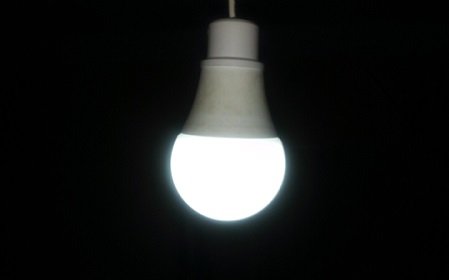
Let’s try to consider replacing all the AC components in our homes e.g. (Bulbs, fans, refrigerator, Air-conditioner) to DC. Great idea right? Because this time we would only be replacing our appliances with its DC counterpart, e.g. AC bulbs for DC bulbs, AC fans for DC fans, sounds cool right, that way we would not have to convert from DC to AC and just run on AC all through, but hey, the cost of getting just one DC bulb is about 30 times higher than that of an AC bulb. Though DC appliance (mainly electronics) tends to last longer than appliance that runs on AC Owing to the solid state advantage.
Most electronics and Solid State devices (SSD) require DC to power them, in fact, you might then wonder, does that mean an AC supply can power a DC device? Of course not!!, to further answer that question, let’s take a look at your laptop and its power cable, the power cable of your charger was designed to convert the AC coming from the mains into DC. Well if you don’t have access to one now, look closely at mine below, it has an input rating of (100V-240V) because the AC transmission voltage varies in different countries vary, it has an output rating of 20V 2.5A, this is a DC value used to power my Laptop.
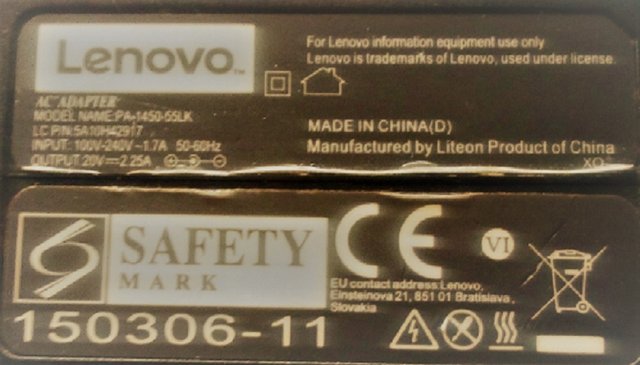
ON A FINAL NOTE
Finally, It would also interest you to know that at the timing of the “War of currents” there was no way to transmit DC through long distances with less power loss, the invention that caused eyes to be more focused on AC then was Transformer, because of the ability of AC voltage to be stepped up and down via the transformer, it was then possible to transmit AC electricity through long distances, But not DC. But now, it seems like there is a level up now that the technology of transmitting DC over long distances exists now, like I said, its up to you to decide.
REFERENCES.
Advantages of HVDC transmission @ electrical engineering portal
Principles of dc generator @ electrical4u
https://en.m.wikipedia.org/wiki/War_of_the_currents
Why didnt Thomas Edison Like alternating curren on quora
History of alternating current
If you write STEM (Science, Technology, Engineering, and Mathematics) related posts, consider joining #steemSTEM on steemit chat or discord here. If you are from Nigeria, you may want to include the #stemng tag in your post. You can visit this blog by @stemng for more details.

You can also join us at Promo-Mentors, to improve your blogging skills. Join our discord channel and meet awesome mentors who are willing and ready to shape your writing skills.

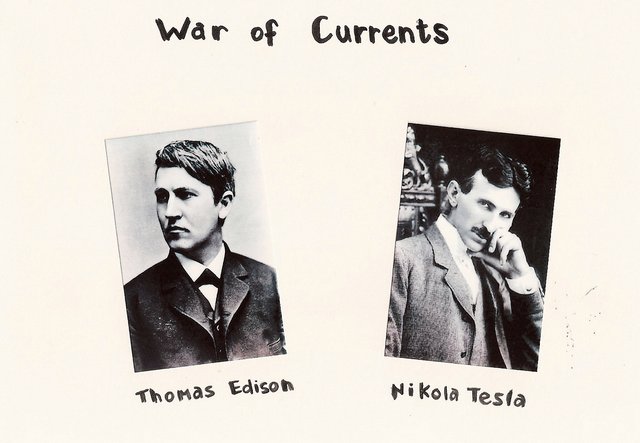
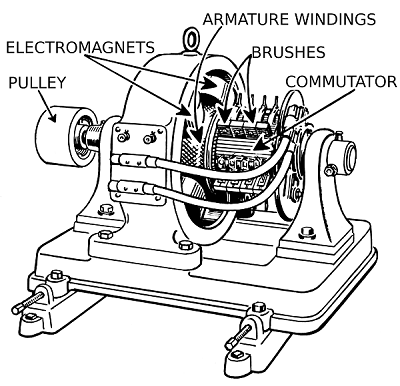
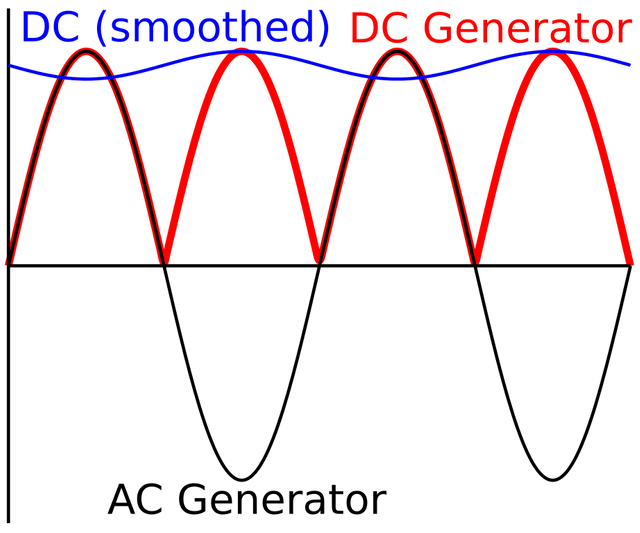
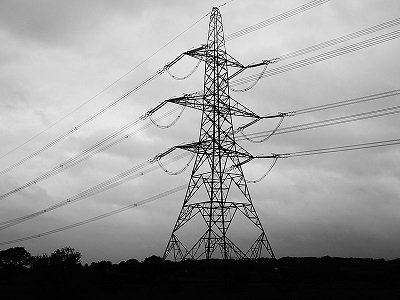
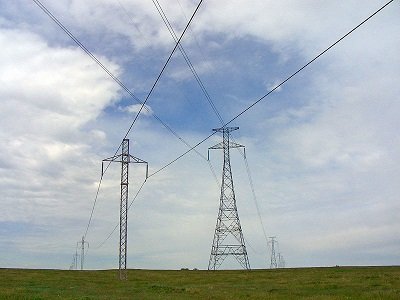)
Mainstream Technology would pick the AC over the DC anyday. Imagine the astronomical amounts of energy that would be required to run a DC.
But yeah, like Green stated, we cannot really do away with DC completely. Stored charges are efficient when one is on the Go.
Hmmmnn.
Running dc powered electronics like your Television, projector etc. Takes a very low amount of energy as compared to AC powered machines like Air conditioners and fans.
But you have a great point when you stated we cant totally do without DC
Like i said earlier, my job is to hive the fact, you give the verdict.
Thanks for stopping by
Well, Inverters in use now doesn't consume more energy as much as you think.. the old modified sine wave Inverters do quite consume a bit of energy but now, we've had advancement in technology.
AC and DC both have their applications, they both make up electricity usage for us all.
Nice post BTW, Kudos!
Hmmnnn.
Nice one boss.
Thanks for stopping by
Which do I prefer? I'd say both; I like that you mention inverter which can easily convert DC to AC. The two has both advantage and disadvantages. First storing AC is hard, but you can easily store DC in batteries. In transmission, AC can be efficiently transmitted in high voltages hundred of kilometres where it is generated with little loses. Also, you can easily play around with AC via the use of a transformer. I like DC because of its ease of storage.
Very wonderful input boss!!!
batteries are suited for storing dc infact if you want to store an AC source, you ll have to first convert to dc for before storing
Thanks for stopping by!!!
You are always welcome to my blog
Hi @lawkay!
Your post was upvoted by utopian.io in cooperation with steemstem - supporting knowledge, innovation and technological advancement on the Steem Blockchain.
Contribute to Open Source with utopian.io
Learn how to contribute on our website and join the new open source economy.
Want to chat? Join the Utopian Community on Discord https://discord.gg/h52nFrV
I hear AC current kills faster than the DC current.. I don't know how true that is but both have their applications in various ways.
Thats true, AC kills faster than DC, due to its alternating polarity.
Well safety precautions are being taken about that so chances of someone dying due to AC shock is mostly due to negligence.
I see... One just has to be careful handling these things. Thanks for your reply
That's a serious good article, that presents the sides fairly. It was the distance that made the decision easy at the start. DC would work fine in cities, but the country was something else entirely.
I really do like this post. I would like to suggest you join the adsactly discord server so your post would be eligible for post of the day,
https://discord.gg/ygj6Cp
Thats very true....
Thats what mainly made people consider the AC in the first place.
I have already joined the discord serer for some weeks now
The ability to carry power across long distances is the most important advantage of AC over DC
Ac is better than DC
Although losses rate are higher than Dc, Ac can carry power to longer distances.
Thanks for sharing
Thats very true @losses rate being higher than dc.
AC can also carry power through long distances.
Thanks for stooping by
well, i would definitely drift towards AC
Noted boss!!!
Thanks for stopping by
For me DC is portable and green and then anything that eliminates the risk of electric shock why not? DC can be improved on and we would love it. Inverters are really expensive AC devices contributes to the reason why solar energy is quite expensive. What if we didn't need inverters the batteries would last longer and cost of batteries would be reduced drastically. If we could let's change it all to DC.
Thats a very good line of thought, however if you read the lattar part of the post, you will see i stated there that deciding to change all appliances to dc is about 30-40 times the cost of its AC counterpart....
We have to factor in that too before making our decisions.
Thanks for stopping by.